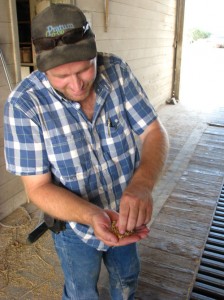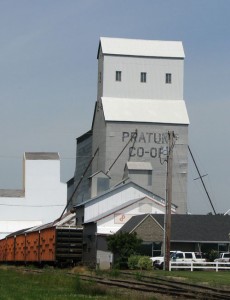Grover Welty remembers when Pratum was quite the going concern.
When he lived there in the 1930s and attended the two-room schoolhouse, the town had a post office, a grocery store – even a tennis court.
“The storekeeper supplied the chicken wire for a backstop,” he said. “When I got to ninth grade, I made the tennis team right off the bat.”
The store was a hub of activity. As a boy, Welty would slip over there after supper, where he’d often find the local softball team, The Nail Keggers, gathered around its potbellied stove. Seating on nail kegs and sending up regular plumes of steam by spitting tobacco at the stove, they discussed current events and frequently talked about “the old days.”
Welty learned about “The Skunk,” the daily passenger train between Silverton and Salem, with a midway stop in Pratum; and heard them gripe about the more prosperous, thrifty Swiss Mennonites who actually settled the area in the late 1800s. Back then, Pratum had a blacksmith shop and a hotel that Welty’s father and brother eventually remodeled into a residence where the Tourtellotte family lives today. This project included lifting off the second story and turning it to face east instead of north.
In the 30s and early 40s, Claude Ramsden ran the warehouse where farmers brought their wheat. He’d speculate on the market and sell the grain, sharing profits with the growers. When it burned down in 1941, Welty was hired to shingle the new one – “the whole shebang.”
“That’s also when the war started,” he added.
In 1946, the warehouse became a co-op of area farmers. One of Pratum Co-op’s founding board members was Clarence “Slim” Simmons, whose son Bob carries on the family tradition.
“I grow grass seed because Pratum Co-op and Mountain View Seeds have treated me fairly through the years,” Bob Simmons said. “And this year when I grew grain, fortunately they had a place for me to put it.”
Much of the original equipment is still in use at the co-op; an old scale from the 40s; a dockage tester from the 50s; and the original, crib-style grain storage bins. Of differing capacities, the 15 bins hold 3,000 tons of grain in an elevator 140 feet high.
From that height, it’s easy to see why the Pratum area, between Silverton and Salem, is a farming mecca. Located in the heart of the world’s finest grass seed production region, Howell Prairie is sheltered by the Cascade Mountains and blessed with fertile soil, mellow sun, gentle rain and mild winters.
Tim Roth, a third-generation farmer in the area, appreciates being able to buy fertilizers and other chemicals locally.
“And, as a member of the co-op, you eventually get a little kickback,” he said.
Simmons credits the forward thinking of past board members and management for Pratum Co-op’s ability not only to survive, but to adapt in such ways that it continues to well serve its members, now totaling about 200.
About 15 years ago, Mountain View Seeds Ltd., a subsidiary of Pratum Co-op, was formed in response to the booming grass seed industry. One of the United States’ largest integrated seed companies, it develops and produces new varieties through an owner-grower base, packaging it to industry needs and marketing and distributing it world wide.
Other divisions include Pratum Co-op’s fuel service; fertilizer and chemical sales; seed cleaning; lubrication and oil; a Chevron gasoline station; and a card-lock gasoline and diesel station.
While glad for the improvements, right now many co-op members are thanking their lucky stars that still standing alongside the modern 150,000-square-foot facility is the circa-1941 warehouse and grain elevator.
With the dramatic rise in the grass seed market over the past 15-20 years or so, grain elevators such as Pratum’s have become almost obsolete. In recent years, elevators in Canby, Silverton, Sheridan, Amity and Stayton have all been razed.
For the time being, the halcyon years of pumping out grass seed have been put on pause, and local farmers are looking to find alternatives for these acres: vegetables, flowers, clovers, grains and a number of specialty crops.
“Right now anything’s doing better; there’s such a glut of grass seed,” said Dave Barth, a field man with Pratum Co-op. “There’s a large inventory in warehouses valley-wide. The seed companies can’t afford to pay the farmers because they’re not getting paid.”
Many farmers have returned to growing wheat.
“Wheat is a public commodity; a cash crop,” Barth said. “If you grow it, you will be able to sell it. The price might be terrible, but you can sell and get cash.”
But for many farmers, it’s what to do with the wheat in the meantime that has them in a quandary.
“Many farmers are scrambling for a place to store their grain,” Barth said.
Like the others, Roth is diversifying. He’s planting additional hazelnuts, cannery vegetables and this year, after a 20-year hiatus, wheat.
He finds not much has changed.
“Twenty years ago, we’d store it, hoping the price would get to $5 a bushel,” he said. “I think that only happened once – usually it would go anywhere from $2.50 to $4.50. A couple years ago, it went up to $15; last year it was at $8 or $9.
“Now it’s dropped to $4.50; so I’m still waiting for $5 – after 20 years.”
“The Howell Prairie region is a unique little area where you can still make a living off of 500 acres,” Simmons said. “But it won’t be if it all goes to grain forever.”
